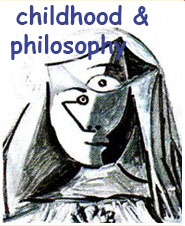conjugar-se com o (que é) outro na experiência do filosofar
DOI:
https://doi.org/10.12957/childphilo.2016.25917Parole chiave:
filosofar, crianças, adultos, imagens, palavras.Abstract
Torna-se cada vez mais um desafio situar-nos para além de nossas palavras, quase sempre repetidas e esvaziadas. Esse texto apresenta e pensa duas novas possibilidades de experiências do Grupo de Estudos e Pesquisas “Filosofia para Crianças” (GEPFC – FCLAr – CNPq) que pretendem enfrentá-lo, “desconcertando” pensamentos e leituras de mundo: a primeira inventa outro modo de ler o “Abecedário de Deleuze”, transitando com palavras e imagens (desenhos); e a segunda coloca crianças e adultos filosofando juntos. “Desconcertar o pensamento” é procurar caminhos diferentes para que possamos nos abrir ao novo, ao (que é) outro, fazendo exercícios que nos permitam realizar experiências de pensamento, alargando os sentidos de nossa existência. Inspirado em Benjamin vemos a experiência filosófica como comportando três degraus (móveis): o musical (em que ela é composta), o arquitetônico (em que ela é construída) e o têxtil (em que ela é tecida). Andar pelos degraus da experiência filosófica é conjugar-se com o (que é) outro. Um sujeito que filosofa há que poder ser outro (e não ser palavra de poder para o outro) e saber do outro, saber-se outro e saber-se com o outro (e não apequenar o outro com nossos saberes porque assim, inclusive, apequenamos a nós mesmos). Mas há infinitas conjugações e delas nascem gestos que são modos de dizer (linguagem). Quando amoroso, esse gesto-linguagem cria um espaço novo entre os dois pontos não coincidentes e é essa novidade que abre espaço para a experiência filosófica distanciando-nos de saberes e poderes que nos apequenam.



